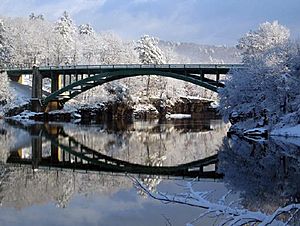Narrowsburg–Darbytown Bridge facts for kids
Quick facts for kids Narrowsburg–Darbytown Bridge |
|
|---|---|

Elevation in winter
|
|
| Coordinates | 41°36′35″N 75°03′43″W / 41.609715°N 75.061855°W |
| Carries | 2 lanes of |
| Crosses | Delaware River |
| Locale | Darbytown, Pennsylvania and Narrowsburg, New York |
| Official name | Narrowsburg–Darbytown Bridge |
| Owner | New York–Pennsylvania Joint Interstate Bridge Commission |
| Maintained by | New York–Pennsylvania Joint Interstate Bridge Commission |
| Characteristics | |
| Design | Steel arch under bridge |
| Number of spans | 1 |
| Piers in water | None |
| History | |
| Construction begin | April 16, 1953 |
| Opened | August 31, 1954 |
The Narrowsburg–Darbytown Bridge is a special kind of bridge that crosses the Delaware River. It connects two places: Darbytown, Pennsylvania and Narrowsburg, New York. This bridge is an arch under bridge, which means its main support structure is a big arch underneath the road.
The bridge helps people travel between states. It carries two important roads, Pennsylvania Route 652 and New York State Route 52. The town of Narrowsburg got its name because it's the narrowest part of the Delaware River. This makes it a good spot for a bridge!
Contents
The Bridge's Long History
The idea for a bridge in this spot is very old. Around 1810 or 1830, a group called the Narrowsburg Bridge Company got permission to build a bridge. This permission was called a charter.
Early Bridges and Tolls
The first bridge built here was about 25 feet (7.6 meters) wide. People had to pay a fee, called a toll, to cross it. For example, a wagon with one horse cost about 37 ½ cents. A person walking paid 6 cents. To understand how much this was, a worker back then might earn one dollar for a whole day's work.
This early bridge was part of a bigger travel system. It connected to a road called the Mount Hope–Lumberland Turnpike, which started in 1812. This road went from Orange County, New York to Honesdale, Pennsylvania. Sadly, ice and high water in the river destroyed at least two bridges before 1848.
The Iron Bridge and Going Toll-Free
In 1899, a new bridge was built by the Oswego Bridge Company. This one was made of iron and lasted for many years. It was used until the current bridge opened in 1954.
For a long time, people still had to pay a toll to cross the iron bridge. But on January 12, 1927, that changed! The New York-Pennsylvania Joint Bridge Commission bought the bridge for $55,000. After that, it became completely free to cross.
Building the Current Bridge
The bridge we see today was started on April 16, 1953. It was finished and opened to traffic on August 31, 1954. This modern bridge has been helping people cross the Delaware River ever since.
Keeping the Bridge Safe
Bridges need regular check-ups and repairs to stay safe. In 2013, the Narrowsburg–Darbytown Bridge had some emergency repairs. These repairs cost between $200,000 and $250,000.
More work was done on the bridge in 2018. This included important structural repairs, repaving the road, and repainting the bridge. These efforts help make sure the bridge remains strong and safe for everyone who uses it.
See also
- List of crossings of the Delaware River
- New York–Pennsylvania Joint Interstate Bridge Commission
 | Calvin Brent |
 | Walter T. Bailey |
 | Martha Cassell Thompson |
 | Alberta Jeannette Cassell |

